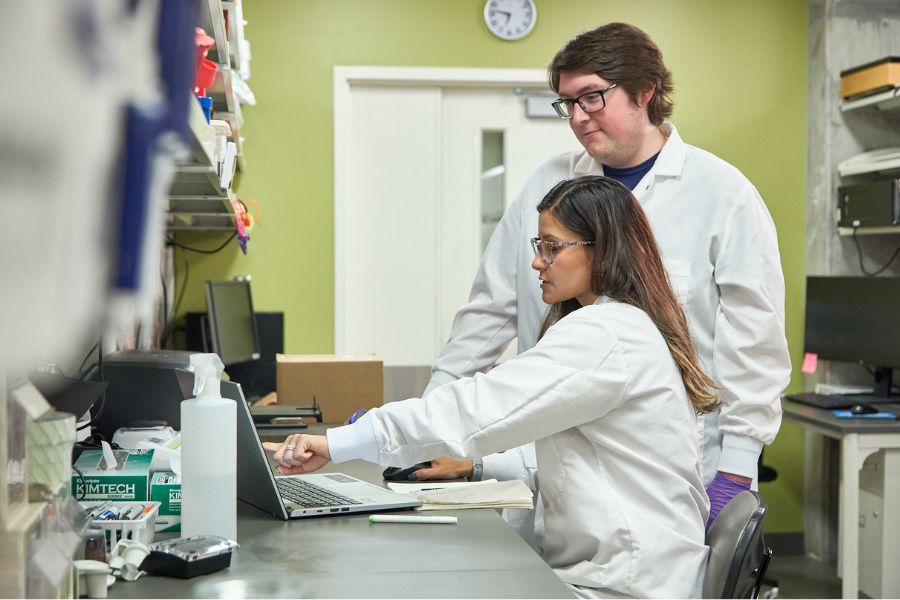Purdue to launch musculoskeletal center in Indianapolis

Eager to grow in Indianapolis, Purdue University’s Weldon School of Biomedical Engineering (BME) has announced a plan to launch the Purdue Center for Musculoskeletal Engineering (PCME) in the capital city.
Musculoskeletal diseases, such as osteoarthritis or osteoporosis, affect scores of Americans and place a significant burden on health, quality of life and the health care system as a whole. A major goal of the center is to use engineering approaches to help prevent diseases harmful to the musculoskeletal system and treat them more efficiently when they occur.
“Purdue has the engineering and scientific expertise to drive new approaches and new solutions for these problems, and this center brings those strengths together to improve health and mobility for millions of people,” said Joseph Wallace, Purdue’s associate vice president for research development and professor of biomedical engineering in Indianapolis. He will serve as the center’s inaugural director.
“This center reinforces Purdue’s leading role in biomedical engineering research excellence,” said Arvind Raman, the John A. Edwardson Dean of the College of Engineering and the Robert V. Adams Professor in Mechanical Engineering. “We believe future discoveries from PCME will have lasting real-world impacts felt well beyond just the city of Indianapolis.”
“Indiana is the nation’s No. 1 life sciences exporter and home to Warsaw, the ‘orthopedics capital of the world.’ At Purdue’s Weldon School of Biomedical Engineering, we have doubled undergraduate enrollment in six years and sponsored research in seven. PCME strengthens our base in Indianapolis and positions us to help lead the ecosystem to its next giant leap of innovation,” said Kevin J. Otto, the Dane A. Miller Head of Biomedical Engineering.
“PCME is another step in our continued expansion in Indianapolis that brings the power of Purdue’s research excellence to the capital city,” said David Umulis, Purdue’s senior vice provost for Indianapolis. “By combining engineering innovation with impactful medical research, we’re opening doors to transformative solutions that can change lives.”
PCME will be a gathering point for current Purdue faculty who work in areas that align with musculoskeletal disease and health, as well as a place where researchers can support one another and foster collaboration.
The center is in its infancy, “so we have to build around the preexisting strengths of Purdue faculty who are currently studying musculoskeletal tissues,” Wallace said. Current research targets bone, cartilage, tendons and ligaments, and basic tissue extracellular matrices, but eventually PCME will extend into muscle and spine/intervertebral disc.
“There are many diseases and injuries that impact these tissues. Most would probably think of osteoporosis (bone) and osteoarthritis (cartilage),” Wallace said. His lab, however, studies diabetes and chronic kidney disease — both of which have major impacts on the skeleton, leading to dramatic increases in fracture risk.
All of PCME’s researchers already have robust research programs of their own, and many of them already are members of the Indiana Center for Musculoskeletal Health (ICMH) at Indiana University School of Medicine (IUSM).
“This new center will be in alignment with their goals — but with a Purdue focus,” Wallace said, adding that IUSM and Purdue’s BME already share a joint Doctor of Medicine/PhD program. “I see this as being mutually beneficial to all since more of our focus is on the engineering aspect,” Wallace explained.
“Engineering is an important part of the equation,” Wallace said. “While we will continue to be members of ICMH, this new Purdue center formalizes our own commitment to solving the complex problems facing this important organ system.”
On Sept. 18, Purdue was part of a consortium that was announced as one of the 15 finalists to advance to the next round of the National Science Foundation’s Regional Innovation Engines competition. The program supports flourishing innovation ecosystems to spur economic growth in critical technologies. The competition started with about 300 letters of intent in summer 2024 and was whittled down to 71, then 29 and now 15.
“Our joint proposal — with IUSM leading and multiple other partners across the state participating — is a finalist for a 10-year, $160 million grant aimed at building a musculoskeletal health innovation ecosystem across Indiana that bridges the gap between unmet medical needs and the technologies that can solve them,” said Wallace, who has been working in Indianapolis for 15 years.
An active and collaborative musculoskeletal researcher, Wallace currently is funded by the National Science Foundation, National Institutes of Health and the Veterans Administration. He has worked closely with partners across the Indianapolis ecosystem, as well as nationally and internationally.
“I know how beneficial strong relationships can be,” he said. “When I imagine building those relationships at a higher level, I see the potential for great things.”
This center aligns with Purdue's presidential One Health initiative, which involves research at the intersection of human, animal and plant health and well-being.
